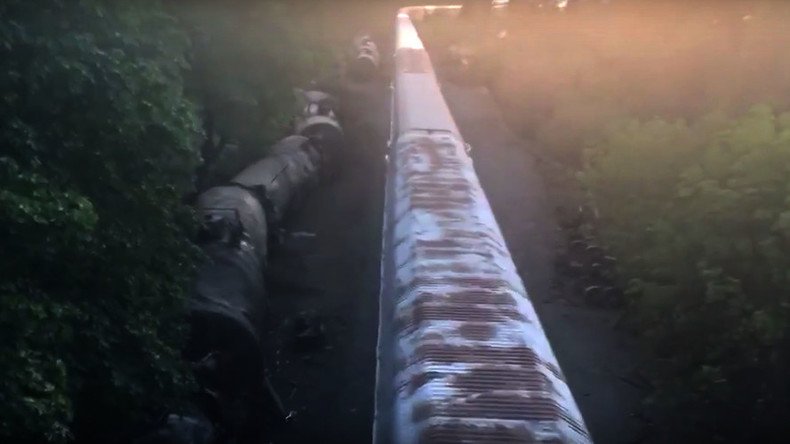Trains back on track in Oregon 3 days since disaster, angering locals and politicians

Union Pacific trains are operating again in Mosier, Oregon, where only three days ago a derailment and explosion occurred as one transported crude oil. Running trains next to the spot where the damaged cars stay sitting, still full of oil, has left residents furious.
Union Pacific train operations returned to normal despite the cleanup that has yet to be completed. The June 3 derailment took place in a small town by the Columbia River gorge on a stretch of track that passes within 300 feet (91 meters) of a school, the Associated Press reported.
Oil train clean up after derailment in Mosier Oregon. What local officials want to stop. @KGWNewspic.twitter.com/8aL5OJrnYF
— Tim Gordon (@TimGordonKGW) June 6, 2016
“Oil train tankers are still lying on their side in Mosier, the ground and water have yet to be cleaned up, and there’s still no good explanation for the cause of Friday’s crash. It is too soon to resume oil train traffic through the Columbia River Gorge,” said Senators Jeff Merkley and Ron Wyden of Oregon, Governor Kate Brown and Representatives Earl Blumenauer and Suzanne Bonamici in a joint statement released Monday.
“We will also be pushing for the Department of Transportation to take a hard look at alternative routes for oil and hazardous material trains that would put fewer Oregonians at risk of a dangerous crash in their backyards,” the statement read.
Residents of Mosier expressed anger and concerns as well about the immediate return to normal.
"This is all about money. They're willing to risk us blowing up again for their money to keep coming in," Loretta Scheler, a landowner whose property was near the site, told the AP.
Union Pacific rep apologizes to Mosier, Oregon for train derailment and fire. pic.twitter.com/RV48vJgO29
— Amelia Templeton (@ameliaOPB) June 4, 2016
Brett VandenHeuvel, executive director of the Columbia Riverkeeper, feels that this incident highlights flaws in the system that approves shipments, telling the AP, “I can't see how any reasonable person can look at this explosion and invite more trains."
The smoke from Friday’s accident was visible for miles when the train derailed outside the town of Mosier, some 68 miles east of Portland. Union Pacific confirmed 16 cars from the 96-car train were involved in the accident, and that oil was released from at least one car. After the derailment, a fire broke out, involving four cars and eventually an explosion. There were no reports of injuries.
Union Pacific has defended the decision to restart operations by explaining that none of the currently running trains contain crude oil.
"We will not run any crude oil trains through this area any time soon," Justin Jacobs, Union Pacific spokesman, told the AP. Union Pacific has also said that it is safe to run trains by the area where the crude oil cleanup is still ongoing.
About a hundred people, a quarter of the Mosier's population were evacuated from their homes since the crash in an area about a quarter mile around the train.
While the citizens may be frustrated, being able to take action to prevent crude oil containers from passing through could be difficult. Interstate train commerce is regulated by the federal government, which prevents local governments from having much of a say in the movements of trains.
Although the trains have resumed operations, life in Mosier will take longer than a three day weekend to get back to normal.
Meanwhile, the remainder of the school year has been canceled.
New rules for oil-packing ‘bomb trains’ leave all parties dissatisfied http://t.co/KyZiIT04uWpic.twitter.com/Or6u68uiuo
— RT America (@RT_America) May 7, 2015
As a result, some towns and cities have created zoning laws to prevent the crude containers from passing through. Hoquiam, Washington banned bulk crude storage last year. Hood River, a town 7 miles (11 km) away from Mosier passed a resolution in 2014 that opposed the transportation of crude oil through the Columbia River Gorge.
Hood River Mayor Paul Blackburn told the AP, "The federal government, the railroad and oil companies need to protect us."
Last year, Senator Wyden introduced the Hazardous Materials Rail Transportation Safety Improvement Act, which would provide tax incentives for company to upgrade to safer cars than 1232 oil tank cars, the type of car involved in this latest accident.
Senator Wyden has also called for increased notification of railroad shipments of oil and other hazardous material to give first responders the information they need to respond to potential accidents.












